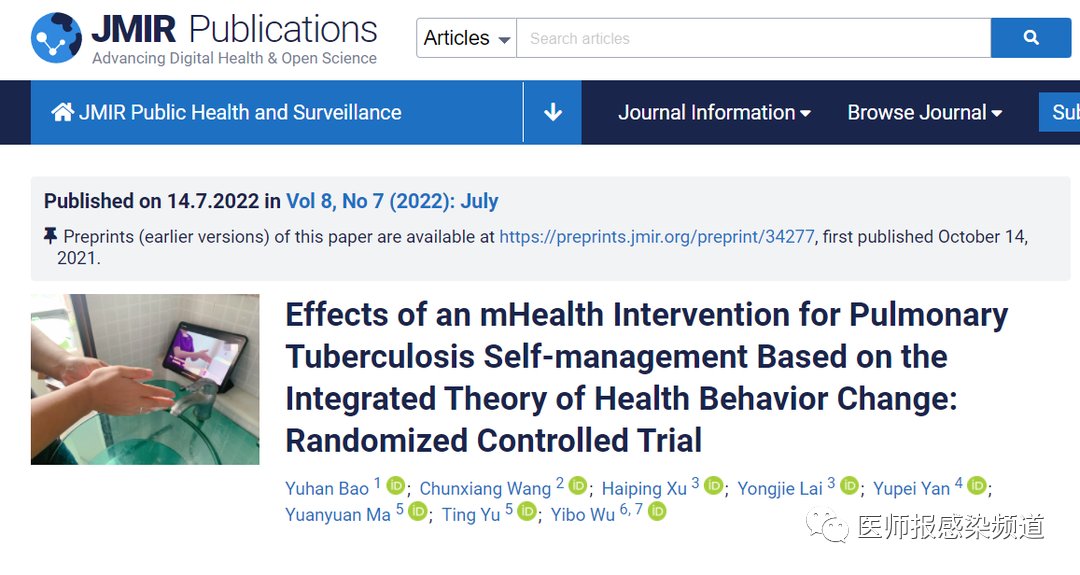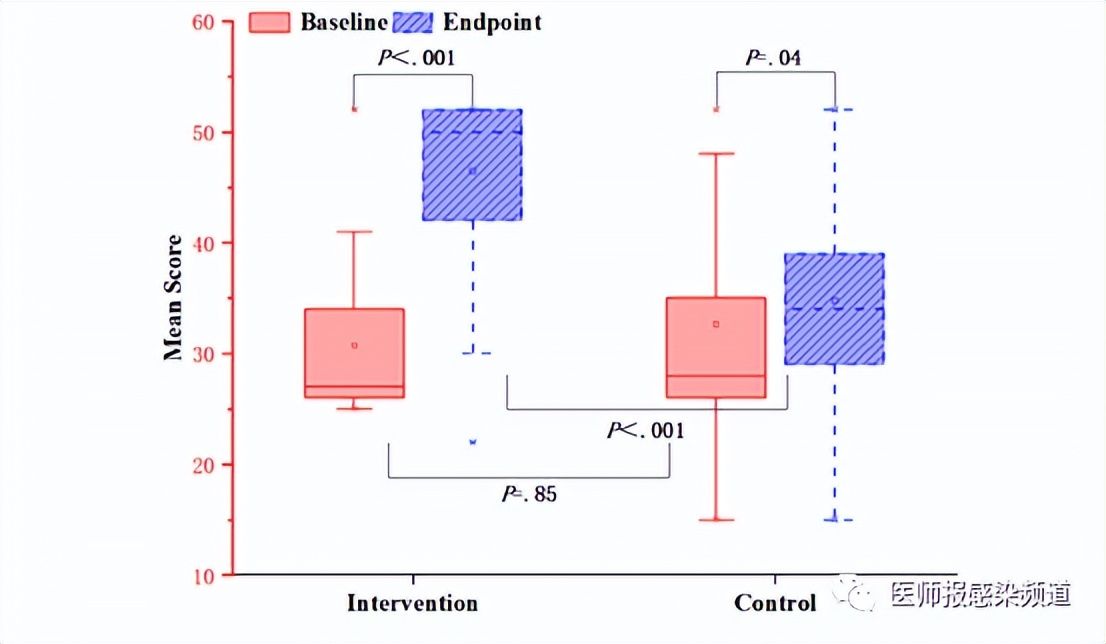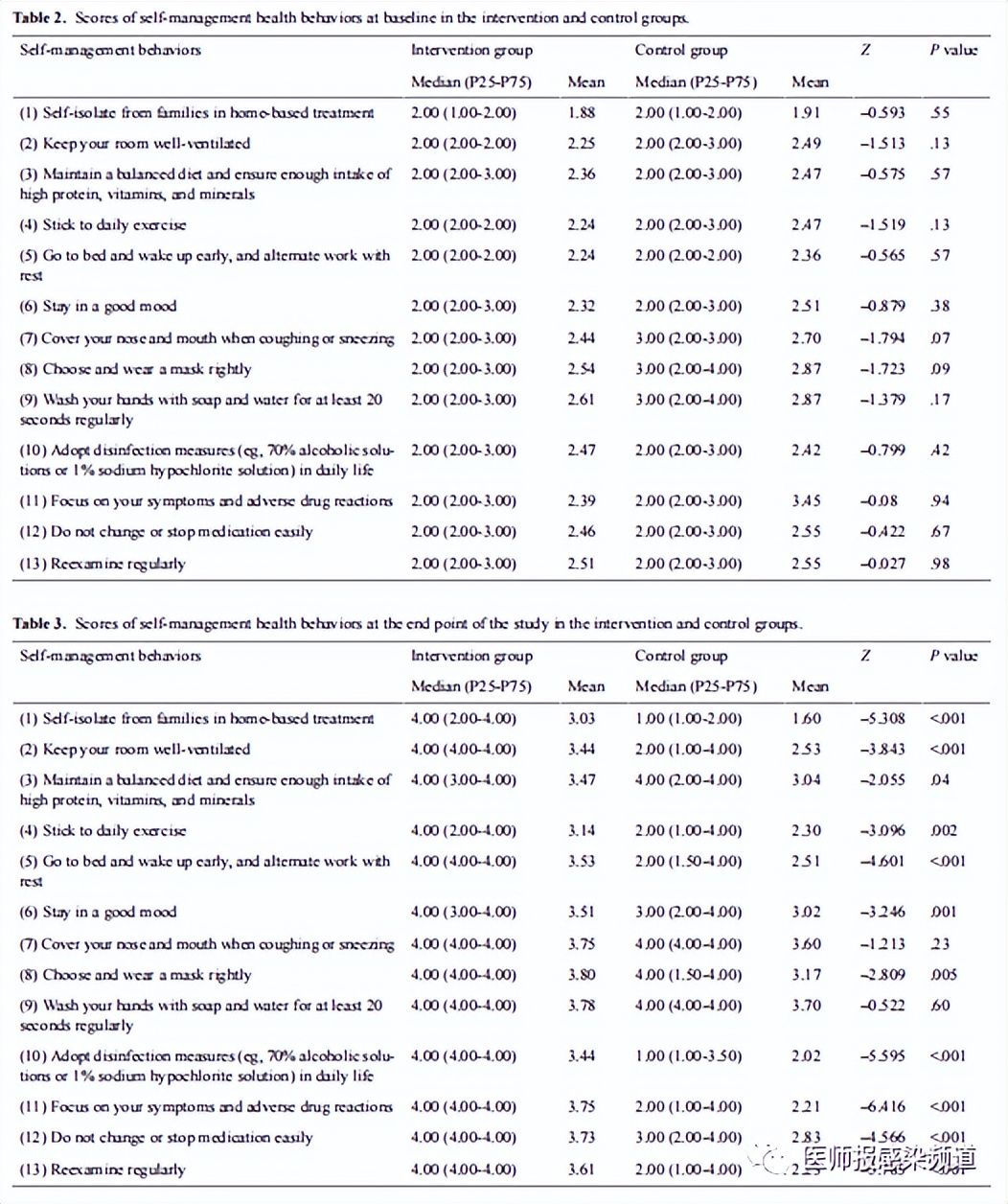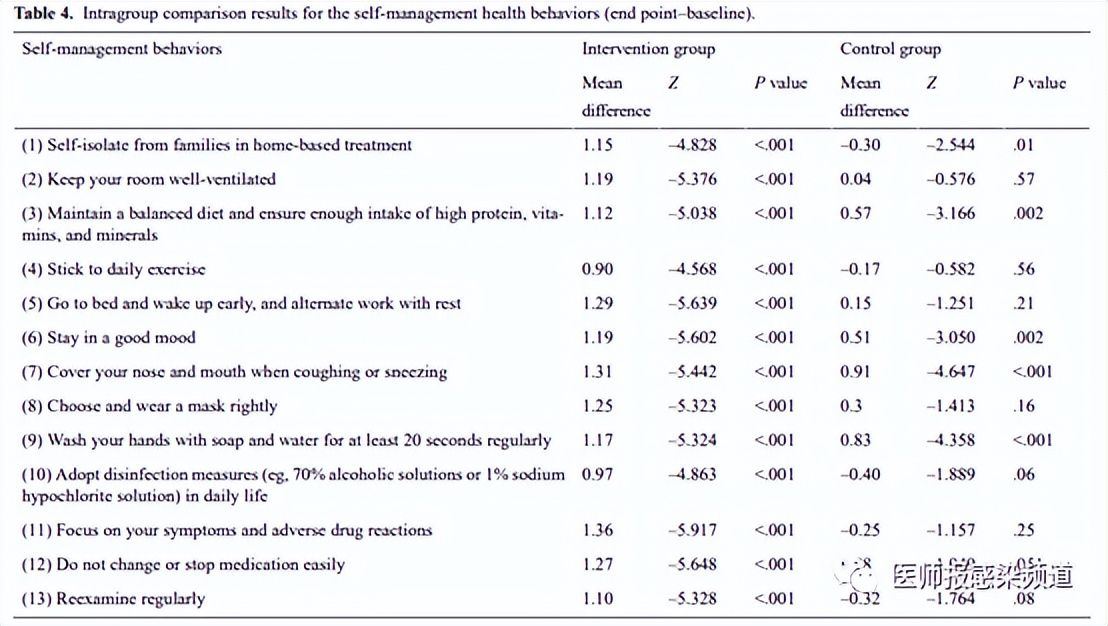Author:Wu Yiwei
In the hot summer, are you chatting on WeChat while blowing the air conditioner at home? As a product of mobile Internet technology, WeChat is mostly used as a communication tool, but in the eyes of scientists, it still has an unusual intervention role.
On July 14, 2022, the internationally renowned academic journal “JMIR PUBLIC HEALTH AND SURVEILLANCE” (JCR Q1, IF=14.557) published online a research paper by Wu Yibo’s team from Peking University School of Public Health, titled ” Effects of an mHealth Intervention for Pulmonary Tuberculosis Self-management Based on the Integrated Theory of Health Behavior Change: Randomized Controlled Trial”, published a study on the impact of a health intervention based on the Integrated Theory of Health Behavior Change on the self-management of tuberculosis patients.

Study finds that mobile health (mHealth) intervention based on Integrative Theory of Health Behavior Change (ITHBC) is expected to improve tuberculosis (TB) Patients’ self-health management level, improve the cure rate, and control the spread of tuberculosis.
Association between social media and health interventions
Tuberculosis, one of the leading causes of death from a single infectious disease, is a major global public health problem. my country is one of the 30 countries with a high burden of tuberculosis. In 2020, there will be 842,000 new cases of tuberculosis in my country, ranking second in the world.
Why are scientists looking for new ways to intervene? Especially with social media, a tool that most people don’t think is associated with medical technology. In fact, one of the most common interventions prior to mobile health interventions was direct observation therapy (DOT), in which patients are closely monitored to improve medication adherence. However, the implementation of DOT is inconvenient, and the COVID-19 pandemic has created the need for “social distancing” in recent years. Under the influence of various factors, a mobile health intervention for tuberculosis patients based on the Integrated Theory of Health Behavior Change (ITHBC) was proposed and empirically demonstrated by this research team.
Research process
The research team conducted a prospective randomized controlled trial in Harbin Chest Hospital, China from May to November 2020. 114 patients with pulmonary tuberculosis were recruited by random sampling and assigned to the intervention group and the control group in a ratio of 1:1 using a computer random number generator.
The research team provided the intervention group with pharmacist-assisted mobile health intervention based on ITHBC tuberculosis management theory for 3 months. Short-term goals in weeks, the plan for the next 2 months will be arranged according to the patient’s performance in the previous month.
During the intervention period, pharmacists provided health education to patients through WeChat groups in the form of articles, pictures or videos every day, and reminded them to take medicines on time. Families of patients receive health education with patients, participate in web-based lectures, they are encouraged to take the lead in adopting healthy behaviors, and provide comfort and companionship to patients in their families.
Patients in the WeChat group communicate with each other and encourage each other. Patients were asked to self-monitor and record daily health behaviors and emotions, and pharmacists held a meeting every Saturday in a WeChat group where patients reported and self-assessed their behaviors and emotions.
Self-management behavior was the main outcome of this study, which was measured using a structured scale designed by the research team. General self-management behaviors included COVID-19-related behaviors, drug use behaviors, and living habits. Using 13 indicators of self-management behaviors and a 5-level Likert scale, each self-management behavior is scored on a scale of 1-4, 1 = unintentional action, 2 = intentional action, 3 = action but stop, 4 = start action, 5 = action and Consider continuing. Higher scores indicate better self-management behaviors. Calculate the total score for all 13 self-management behaviors. Scores in both groups were greater than baseline (P<.001 vs P=.04), and the total score in the intervention group was higher than that in the control group (P<.001) (Figure 1).

Figure 1
Table 2 shows all self-management behavior scores for the intervention and control groups at baseline The difference was not statistically significant (P>.05). Table 3 shows that after the intervention, there were significant differences in scores between the 2 groups except for “covering your mouth and nose when coughing or sneezing” (P = .23) and “washing your hands properly” (P = .60) (Figure 2).

Figure 2
Table 4 shows the intra-group comparison results of self-management health behaviors before and after the intervention (Figure 2). 3). After the intervention, the scores of each item of self-management behavior in the intervention group were significantly different from those at baseline (P<.001). The scores for "Self-isolation in home therapy" in the control group were lower than baseline (P=.01), while "maintain a balanced diet with high protein, vitamin and mineral intake" (P=.002), "maintain a good Emotional (P=.002), "covering your nose and mouth when coughing or sneezing" (P<.001) and "proper hand washing" (P<.001) scores were higher than the baseline, and the rest of the behaviors were not compared with the baseline. Statistical significance (P>.05).

Figure 3
For item “Self-Isolation from Family in Family Therapy”, Intervention Both the group and the control group scored lower than any other behavior. In addition, the items that “do not intend to take this action (i.e., self-isolate)” were found to have the most responses, likely due to the fact that not every TB patient is contagious and requires sputum culture results to decide whether to self-isolate. However, compared with the scores at baseline, the scores in the intervention group increased (P<.001), and the scores in the control group decreased (P=.01). Prolonged treatment time is considered to be undesired by patientsThe main reason for self-isolation, suggesting that effective health education facilitates the choice of self-isolation.
The study also found that nutritional therapy is the basis of TB treatment. Guiding each patient to maintain a balanced diet increased the related behavior scores in both groups, and the scores in the intervention group were higher than those in the control group (P=.04). A positive attitude helps with healing, and improved health brings joy to the patient. In both groups, the score of the item “maintaining a good mood” increased with the mobile health intervention, indicating that the intervention had a better effect on mood. Tuberculosis and COVID-19 share similar routes of transmission and prevention, with scores for items “covering your nose and mouth when coughing or sneezing” and items “washing your hands properly” showing similar increases in both groups, likely attributable to COVID-19 -The improvement of people’s awareness of infectious disease prevention during the 19 epidemic. In addition, by reviewing medical records and consulting on WeChat, the rate of follow-up visits in the intervention group was higher than that in the control group (P=.22), indicating that the ITHBC-based mobile health intervention has a positive effect on patient compliance.
The research results show that the mobile health intervention based on ITHBC may be a new treatment strategy for tuberculosis, which is beneficial to improve the subjective initiative and self-management behavior of patients, and is beneficial to improve the compliance and prevention and control of tuberculosis patients. quality.
About the main author

Bao Yuhan, member of the Health Communication Committee of the Chinese Medical Doctor Association, Heilongjiang Geriatrics Research Association for the Elderly Member of Clinical Pharmacy Professional Committee

Wu Yibo Shaanxi (University) Key Research Base of Philosophy and Social Sciences – Deputy Director of Health Culture Research Center< /p>